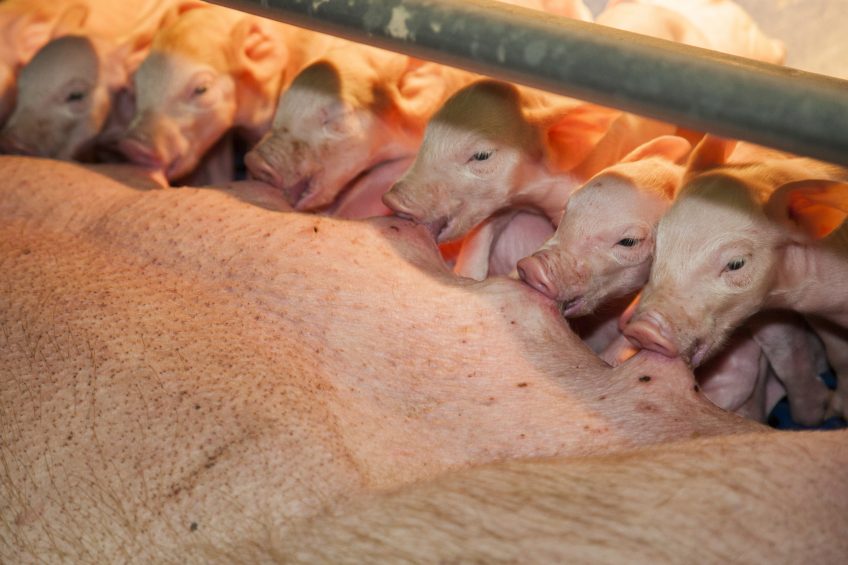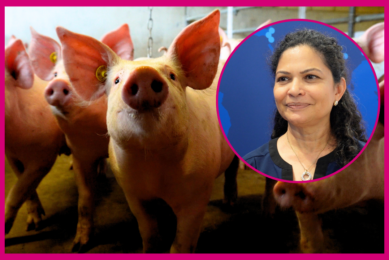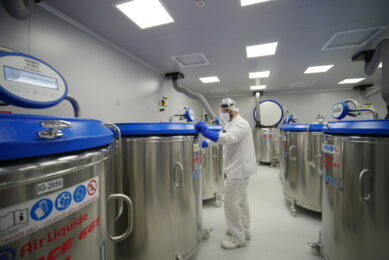Better piglet health by enhancing sow diets

It is becoming increasingly clear that piglet performance can be increased through providing the right nutrients to sows. One method to do so is by applying the use of alpha-monoglycerides into sow diets. This has led to positive results for piglets in Germany.
In the beginning of their lives, young piglets are fully dependent on their mothers’ milk. Therefore, it is essential that the sow produces sufficient milk quantities that are of high quality. Many elements are involved in achieving that, like farm management, genetics and nutrition. Farmers are continuously seeking new opportunities to improve the performance of their sows and their offspring. One of these possibilities is to include specific feed additives. These feed additives can support sow health and thereby improve milk production. As a result, piglets are healthier with higher body weights at weaning which will be benefit them for the rest of their lives.
Managing the gastro-intestinal microflora
Providing sows with sufficient amounts of nutrients during lactation is crucial for optimal performances from the lactating sows and consequently the health and growth of the newborn piglets. Newborn piglets do contaminate themselves heavily with the excrements of the sow during the first days. It is therefore very important to clean the sows before entering the farrowing house, externally as well as internally with antimicrobial feed additives. Moreover, lactating sows have the problem that they need to deliver more nutrients via the milk to the piglets than they can consume themselves through the feed. Therefore, a healthy digestive tract is required to promote a more efficient utilisation of the feed.
Furthermore, it is of the utmost importance to stimulate optimal gut health, since about 70% of the immune system is located in the gut. This means that the gut wall is intact and that there is a balance between common microflora and pathogens, a situation known as ‘eubiosis’.
Stimulating gut health
There are several ways to stimulate (gut) health. Short- and medium chain fatty acids have been widely used for decades. However, they have a potential antimicrobial effect only in their undissociated form and due to their relatively low pKa (dissociation constant) they act mainly in the acidic gastric environment of the animal. However, the alpha-monoglycerides of these fatty acids are much more powerful in their antibacterial effect according to scientific research and do not dissociate in the neutral environment of the intestines.
Alpha-monoglycerides are a class of glycerides that are composed of a fatty acid linked to the sn1-position of a glycerol molecule via an ester bond. This bond makes alpha-monoglycerides remain undissociated independently from the pH. Whereas organic acids will dissociate in the neutral environment of the intestines, alpha-monoglycerides will not dissociate and will be able to perform their antibacterial properties throughout the entire gastro-intestinal tract, which is important for optimal gut health.
Alpha-monoglycerides of short chain fatty acids are known to be more active against gram-negative bacteria, whereas the alpha-monoglycerides of medium chain fatty acids are more active against gram-positive bacteria. Depending on the bacterial challenge on the farm, Framelco has several solutions targeting specific pathogens. When a broad spectrum antibacterial effect is required, FRA Gut Balance is the key to overcome bacterial challenges from both gram-negative and gram-positive bacteria. This approach contains alpha-monoglycerides of both short-chain and medium-chain fatty acids. Also during times of low pathogenic pressure, this strategy has shown to improve general health and performance of animals.
Improving performances of suckling piglets
Piglet performance can be improved as a result of increased milk quantity and quality. The combined effect of using alpha-monoglycerides of short- and medium chain fatty acids on the gut microflora, creating a status of eubiosis, will be beneficial for gut health as well as for a better feed utilisation.
Fewer pathogens affect the environment, and as a result, farrowing crates tend to be cleaner, in turn reducing the risk of infections amongst newborn piglets. Alpha-monoglycerides, more specifically alpha-monoglycerides of medium chain fatty acids, can also be absorbed via the lymphatic system and will subsequently end up in the blood stream, travelling through all the organs of the sow and some will also end up in the milk of the sow. Adding the aforementioned strategy to the sow diet at confinement (one week before farrowing when moving to the farrowing house) and during the lactation period, showed to improve daily growth and weaning weight of the newborn piglets.
These results were obtained at Livestock Feed Tests, a commercial farm with research facilities in Saxony-Anhalt, Germany, during spring and summer of 2017. The farm has 700 productive sows, which work in a weekly rhythm.
Trial set-up
In total 40 sows were used, divided over 2 treatment groups of 20 sows each. The control group did not receive any antimicrobial additive through the feed, whereas the treatment group received 2kg of this alpha-monoglycerides based product per tonne of feed from confinement until the moment of weaning. Both groups received the same basal diet. The statistical analysis was performed on the data of 18 sows in the control group and 19 in the treatment group due to outliers.
The sows in the treatment group were a bit older as indicated by the higher parity number. A higher age usually results in higher number of stillborn piglets. This was also seen in this trial. However, the average body weight of the live born piglets was slightly higher in the treatment group. But more importantly, weaning weight was more than 1kg per piglet higher in the treatment group. Hence, the amount of live weight at weaning per litter was increased by more than 12kg.
More milk yield and better milk quality
The improved weaning weight of the piglets is a direct effect of the alpha-monoglycerides strategy and a result of better sow performance, presumably by more milk yield and better milk quality. Moreover, as a rule of thumb, an increase of 1kg in body weight of weaned piglets will result in 3kg higher body weight at the end of the rearing period. This is of huge economic importance.
Interestingly, the number of losses within 24 hours after birth was reduced with 45% when adding the alpha-monoglycerides strategy to the sow diet. This result indicates that the piglets from the sows receiving this product in their feed are less prone to become infected and consequently are stronger and have a better general health.
The beneficial effect of the alpha-monoglycerides approach can be explained by its beneficial effect on gut health of the sow and by its systemic mode of action. Alpha-monoglycerides, more specifically alpha-monoglycerides of medium chain fatty acids, can be absorbed via the lymphatic system and will subsequently end up in the blood stream and even in the milk of the sow.
This also might overcome problems in sows and piglets with Streptococcus suis infection, a well-known problem in reproduction farms. Hence, the reproduction sows as well as the newborn piglets may benefit from FRA Gut Balance, resulting in an increased body weight of the weaning piglets.











